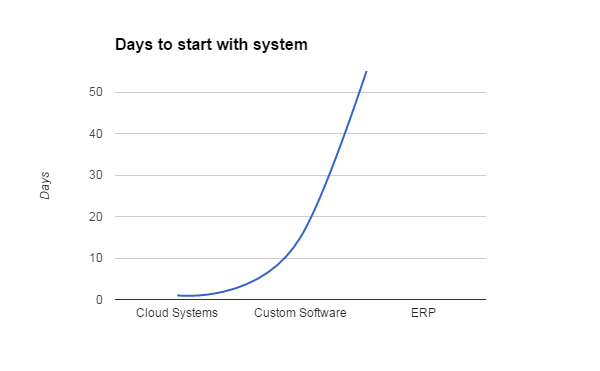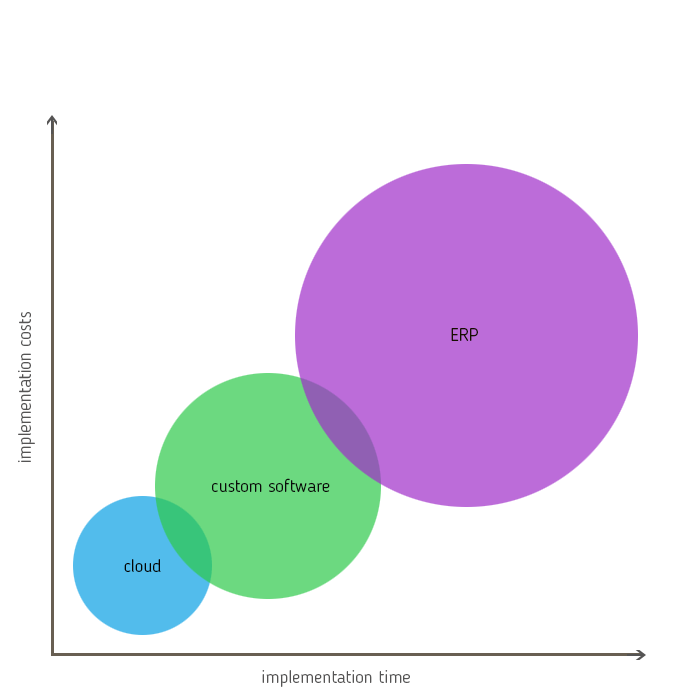Without doubt in an age of IT there is plenty of software and tools developed to automate auto dealer processes: website handling, inventory management, customer relationship, warranty and service management, car history, spare parts trading, document management and others. These tools really work and simplifies daily routines so auto dealer can focus on sales what is more important than f.e. counting tires on stock. Software can keep actual info and update it in real time.

So, having progressive mind, you decide to improve your business, buy or build an inventory management software, represent all your cars on website and external boards like EBay or Craigslist so any customer could find your offers. And now we come to questions: where to start and what to choose? In the end the choice boils down to 3 options:
- implement a complete ERP-style software
- buy an access to any ready-made cloud system in the internet
- develop a custom software.
Let’s compare them and see which is better.
What are these options?

The first option is a complete ERP-style system. These heavy and complicated solutions have been used by many big companies for a long time so must be reliable and useful. With proper configuration they can cover all your needs. But there’s the other side of the coin - as a result of collected experience developers predefined common processes that in original state, I’m almost sure, will not fit your business in real life. Therefore, these systems have also hundreds or even thousands of adjustable parameters and programmable modules to fit any company’s processes. Big auto companies, who chose this way, spent many weeks, even months, and a lot of money on implementation stage to get fitting systems. But they saw benefits: ERP-style software covered almost whole their variety of processes - from the tiniest to the largest ones and allowed the companies to maintain standard procedures in all their branches.
Through cloud software isn’t so flexible and can restrict your freedom, it’s much easier to start with them. You just get what offered: buy a subscription, enter company info, do some allowed customization and create users for your staff. Now you can use it. The problem is you can’t change them almost at all and need several of them. There’s no cloud software for auto dealers that covers all their processes. One system does CRM, another - inventory management for internal processes, third one allows you to run website with catalog, forth - handles your documents. And they most likely can’t be integrated into each other. Yes, probably you don’t need all of them in the beginning, but definitely you will need several ones in near future. And it will take your time to maintain same data in them - f.e same car data in stock management system, on website, on external trading platform, in CRM, in service history.
Custom web based management software can be the thing you want - you can get a friendly web interface and engine that covers all necessary processes and can be flexibly expanded in line with business growth. For example, you decided to get online catalog where customers can search cars by parameters and want to have your cars represented in Google search results. So you need your stock in the web but how to make a custom inventory management software? You just tell consultants what you want to have. You can ask the developer to develop software for an inventory management, integrate the catalog into your current website or update entire website to have new cool features in it. And only you decide or approve suggestions how everything should work and look like. When the development is finished, you will get an independent piece of software you can use right away. Now you can think about automation of next process, f.e car warranty service book.
This approach allows to not affect other processes while automating something and develop your business software piece by piece in short terms. You can continue with next part of system after getting used to first one and allocating new budget, when it is more appropriate time.
The only thing is it’s usually hard to predict when exactly complete business software will be in production, because new demands often come while development and test stage. Furthermore, usually auto dealers are not sure about what will be the next part of software, will it be document management or autoparts inventory software etc. But with agile way, getting software pieces by piece from qualified developer, discussing and testing versions together you will get perfect result. All this requires a proactive stance from you and your key employees.
Starting a productive work

How quick will I be able to start productive work after implementation? It’s always a question to your position in this process, and you competence. But there are obvious differences in these options.
ERP-style systems are usually well-documented and have a lot of tutorials and real user cases described in web. Although this documentation is complete and being periodically updated, it describes standard system but not changes that have been made while implementation. And user cases in the web describes someone’s companies not yours. To learn how to use ERPs you will need to request additional custom documentation and trainings from the integrator - this is new costs. Since you get complete complicated system, your staff has to learn a lot how to work with it before start doing something really productive not worrying about making a mistake.
Cloud based auto dealer software also has good documentation about standard features and usually good online tutorial and consultants which can help your employees to navigate inside the system. Taking into account that there’s not many changes can be made in such system (only some customization), standard documentation and tutorials will help you start using it productively very soon. But this productivity is only about some of the functions you need, for others you will need other cloud systems.
If you order a software development for your dealership you will get the documentation that covers all changes and written in a way your users can easily understand it. The qualified developer communicates with your staff during developing and implementation stage and learns your processes, and your employees get to know what is being built. In the end when they see the final product or some its parts they already know what to do because developer realizes exactly what was requested and agreed while discussions.
Don’t forget about data
The big issue on implementation stage is data transfer. Let’s look at the inventory management. You probably store information about your cars and spare parts in excel sheets, word documents, pdf, in Google documents, in dropbox etc. Your spare parts and car manufacturers send you megabytes of files with prices and characteristics and all these files are in different formats and layouts. Now you start using a system that will handle this information. How to get accumulated information into the software?
With cloud systems the answer is one - manually. You have to copy-paste data from your inventory files to the system or edit and merge them to get proper XLS or CSV fitting for uploading. Takes time isn’t it? The situation with ERP systems and on-demand development is better. Integrators of ERP-style system will modify its database to proper structure and upload all accumulated data by themselves, of course for extra money. Similar case with custom web based inventory management software, the developer checks your data and starts building system that easily allows importing of this data automatically in any time. And it will not raise costs much.
Changes and maintenance
Successful auto dealers quickly adjust themselves to real world changes. This usually requires modification of processes and software they use. For example, you wanted to publish your catalog items on EBay or some other platform automatically, update inventory and sync sales and you got these features in your software. But then EBay changed API or format of uploading csv-files, what will you do? Yes, the software should be modified. And there are many cases when you will need to modify it, this is life.
With ERP-style system it’s almost impossible to do real changes yourself, even if you have an IT department. There’s a risk to get the system down, trying to fix something yourself. Therefore, you should call the integrator to fix issues, and with this type of systems it often takes much time and money, especially if you call for a company different from that that implemented the system.
It is more inconvenient with cloud system, it has same features for all subscribes, and provider will not change them just for you. Although providers always trying to do their best and follow all last changes there’s a risk to go behind your contractors and partners. Furthermore, one day you can login your account and see completely new interface so need to spend time again to get used to it, providers like upgrades.
Custom software is usually not hard to maintain or change, of course if you get it from experienced company. They can even train your IT guys to do some support. But for major changes it’s always better to call same developer. They can do everything remotely and will not forget to update your manuals. You’ll get fixes fast and costs will be affordable. But we should always keep in mind that changing and expanding system too much lead us to creation of own ERP system, what is not good, because it definitely was not planned in correct way.
Costs
In previous paragraphs we have already touched on a question of costs. Let’s just summarize.
Cloud systems are cheapest, but less flexible and can not have some key features for you, instead have some useless. You pay just for subscription and improve your account for additional costs only when necessary, f.e buy additional disk space.
Custom software is in the middle. You always can get the system developed with open source tools, so you just pay for developer time. Qualified developer can have higher hourly rate, than inexperienced one, but definitely do the job in less time. So in result you’ll pay the same but get productive and, more important, reliable system faster. Future costs for maintenance are affordable. We suggest following best experiences and build web based auto dealer software, you will not need any local hardware to maintain it.
ERP-style systems as was described are the most expensive in implementation and maintenance and usually require separate servers to run it. But last years they tend to migrate to clouds - you may not have own local hardware but store the system on cloud and pay for utilized cloud server capacity.

In conclusion
We reviewed three different options to automate processes. The ERP solution is preferred mainly for very big companies with hundreds of various processes, a lot of user roles, worldwide branches, for those who can afford big costs to automate all their procedures with endless number of exceptions. The ERP solutions can do almost everything but this flexibility causes complexity of usage, implementation and maintenance. But automotive giants, many country- and world-wide companies use it with benefits. Are you such kind of company? If yes then you probably may search more info about these systems, f.e. SAP.
If you don’t want complicated things, want to start fast, be on trend and not go behind your competitors, you have to choose web tools. Cloud software is cheap but inflexible, and this may not be a great idea to use them as a main systems in middle-sized and big companies, especially because you often need several of them to cover all needs in the least. Anyway some of them of course acceptable and useful but when used in clear and simple standard processes, that will not be changed in next years, and primary for small business.
The key processes like inventory management is better to be covered by custom web based software. It’s best choice when your processes are more or less manageable and you don’t need a very broad functionality. Why web based? Because web systems are much flexible, unified, accessible from everywhere, modern, easy upgradeable and easy expandable. So you can get flexible working software for affordable cost quite soon.
| Solution | Advantages | Disadvantages | Best use for |
| ERP | * Flexible and can cover all processes * Well-documented * Big user experience | * Complicated in use and maintenance * Expensive * Long implementation stage * Impossible to maintain yourself | Big companies with hundreds of processes |
| Cloud systems | * Cheap * Easy and quick start * Good support and tutorials * Easy to configure as much as allowed by providers | * Not flexible * Doesn’t cover all necessary processes * Initial data input may take time * Providers apply changes you may not like | Standard stable and transparent processes with no integration to other systems required. Primary in small companies |
| Custom software | * Affordable cost * Quite easy and fast to start and get first versions * Easy to communicate with developer * Functionality covers all processes exactly as requested * Users get familiar with system even before full production start * Complete and clear documentation * Flexible and not expensive in customization * Easy to support with own IT dept or outsource the support | * Usually hard to predict date of final release at start * In case of unqualified developer it can be difficult to maintain, change and expand system | All sized companies which want to get not very complicated but useful and, working system for affordable cost very soon |
In fine custom software is most appropriate solution in most cases. But how much does it cost to develop online inventory management software for auto dealer, for example? There’s exact no answer, everything is up to your demands. To calculate it you should call a qualified developer who will do some investigations and then you can get estimate cost. But it’s definitely cheaper than ERP systems. Our company have big successful experience with building web based software for various needs. There were some projects for auto dealers and car trading platforms, one is autobazar.ua. It allows us to say that we know the field and can offer our best services and experience to create an inventory management software for auto dealer or any kind of web based software for car dealership.




